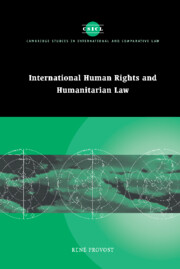Book contents
- Frontmatter
- Contents
- Acknowledgments
- Table of cases
- Table of treaties
- Table of other international instruments
- Introduction
- PART I Normative frameworks
- PART II Reciprocity
- Introduction
- 3 Formation
- 4 Application
- 5 Sanction
- Conclusion to Part II
- PART III Application: law and facts
- General conclusion
- Bibliography
- Index
- CAMBRIDGE STUDIES IN INTERNATIONAL AND COMPARATIVE LAW
Introduction
Published online by Cambridge University Press: 07 September 2009
- Frontmatter
- Contents
- Acknowledgments
- Table of cases
- Table of treaties
- Table of other international instruments
- Introduction
- PART I Normative frameworks
- PART II Reciprocity
- Introduction
- 3 Formation
- 4 Application
- 5 Sanction
- Conclusion to Part II
- PART III Application: law and facts
- General conclusion
- Bibliography
- Index
- CAMBRIDGE STUDIES IN INTERNATIONAL AND COMPARATIVE LAW
Summary
International law, being a system based on the formal equality and sovereignty of states, has arisen largely out of the exchange of reciprocal rights and duties between states. Reciprocity refers to the interdependence of obligations assumed by participants within the schemes created by a legal system. In other words, obligations are reciprocal if their creation, execution and termination depend, in a general manner, on the existence of connected obligations on others. Reciprocity may be fundamental but it is also variable: distinctions must be made according to the type of norms and the kind of relationship they embody. A regional trade treaty and the customary precautionary principle in environmental law, for example, will both imply elements of reciprocity, albeit distinct ones.
Human rights and humanitarian law have been said largely to escape from reciprocity because both essentially aim to protect the interests of individuals rather than states. It would follow that, in the frameworks of human rights and humanitarian law, reciprocity occupies a much smaller place than in the rest of international law. This could provide a rationale for the development of institutions particular to these two areas of law and the unsuitability of some principles of general international law. The ensuing discussion examines various elements of human rights and humanitarian law to determine whether they indicate a relevance for reciprocity markedly more limited than in general international law, and whether similar patterns appear in this respect in both areas of law.
- Type
- Chapter
- Information
- International Human Rights and Humanitarian Law , pp. 121 - 126Publisher: Cambridge University PressPrint publication year: 2002

